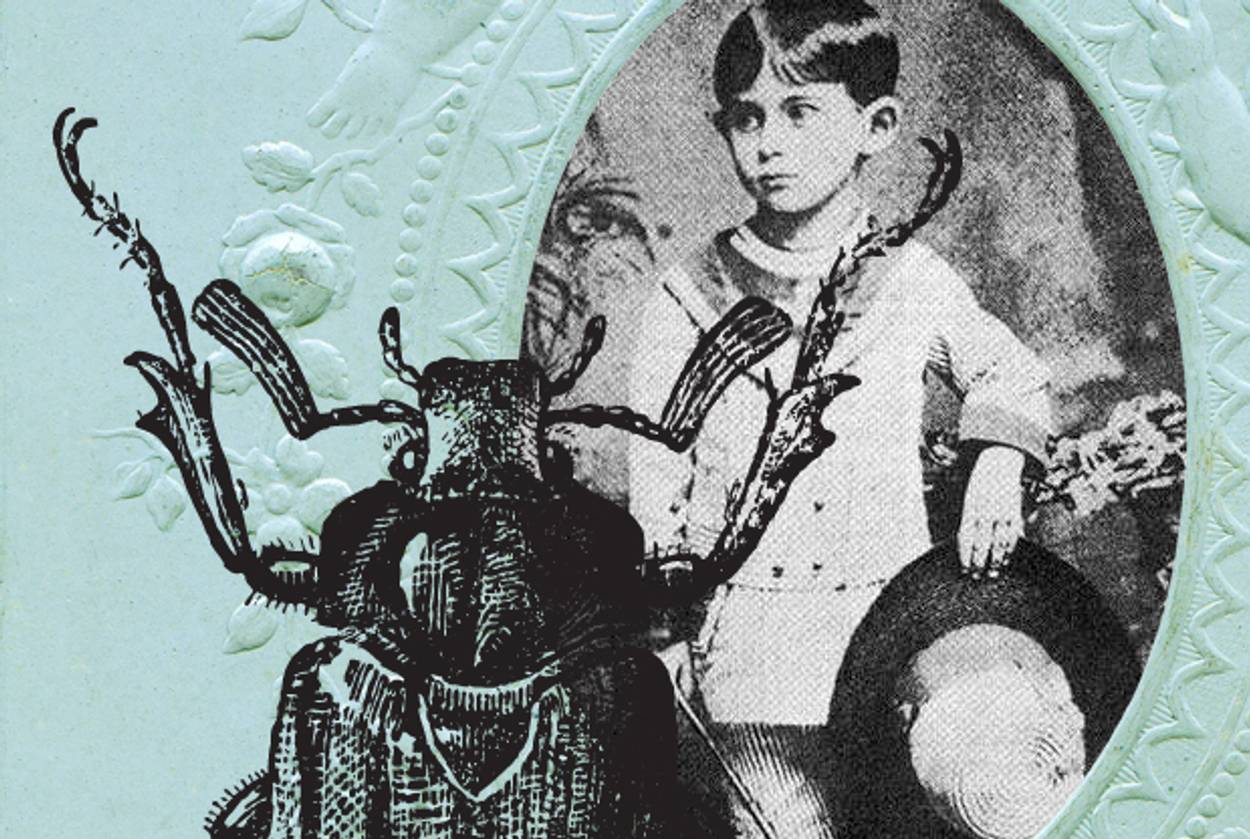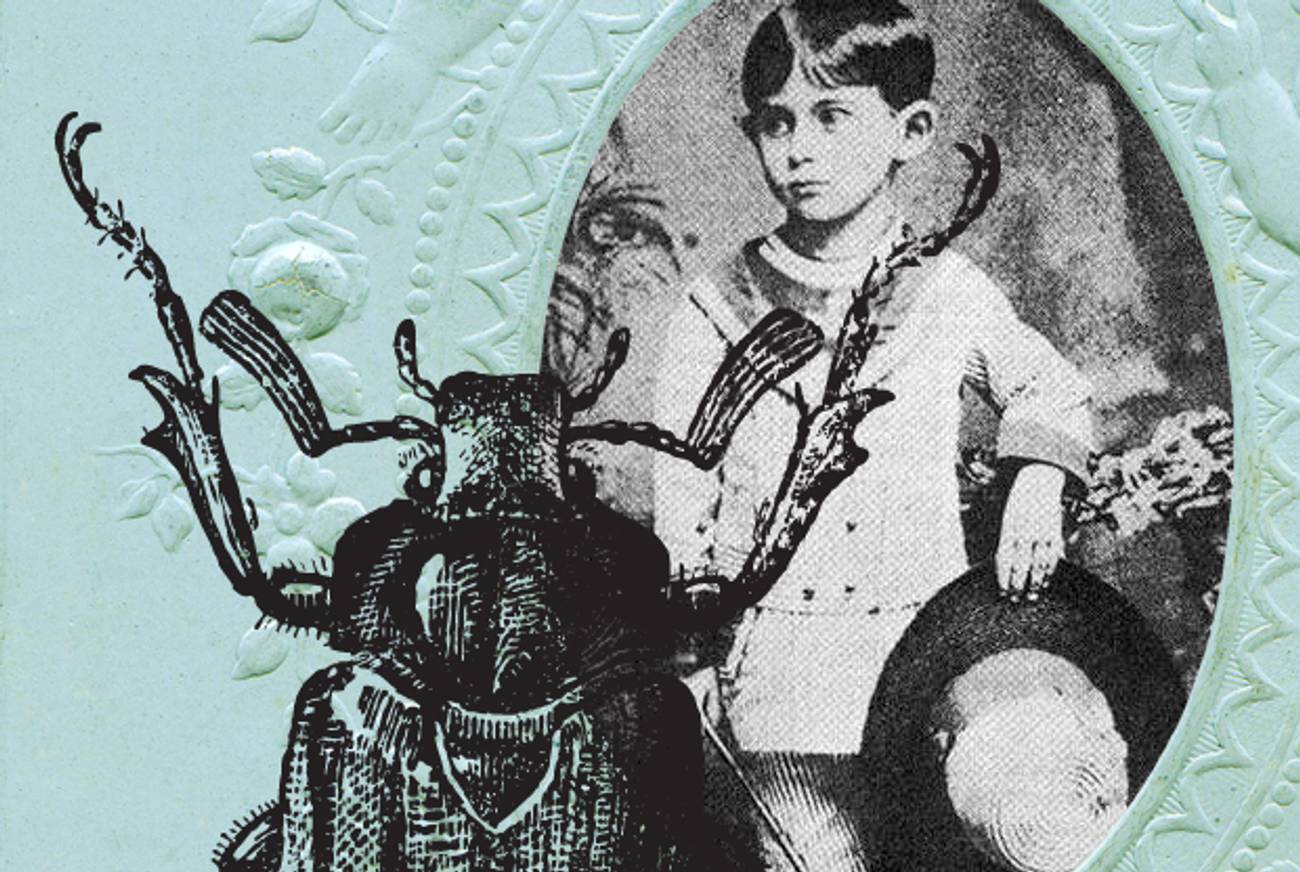Kafka’s Yom Kippur Appeal
A century ago this High Holiday, Franz Kafka composed two masterworks, both informed by his Jewish heritage




The High Holidays of 2012 mark the centenary of one of Franz Kafka’s most inspired feats of writing—the personal, affective moment of creation of two tales of familial guilt, judgment, and quasi-ritual killing. One day after Yom Kippur in 1912 (which fell that year on Sept. 20-21), Franz Kafka composed his short story “The Judgment” (“Das Urteil”) in a single, feverish night.
The story relates the bizarre, “Kafkaesque” situation of Georg Bendemann, who cares for his elderly father and corresponds with a strangely sketchy friend in Russia; in turn, Georg’s father is unaccountably suspicious of virtually everything Georg says or does. Ultimately, his father condemns Georg to death by drowning, which the son promptly and filially enacts by falling off a bridge.
During the weeks that followed this intense feat of writing—more precisely, from the second half of November to the first days of December 1912—Kafka went on to compose the masterpiece, The Metamorphosis (Die Vervandlung). An uncanny articulation of “sacrificial logic” links “The Judgment” and The Metamorphosis with the Akedah, the command to Abraham to offer Isaac as a sacrifice, which is read every year in the Torah service on the second day of Rosh Hashanah. Their juxtaposition reveals profound differences between Jews as both “the people of the book” and “the people of the body.” In this connection between texts, readers can discover a distinct, anti-sacrificial, Kafkaesque Judaism for the 20th century.
All of which poses the question: What, if anything, does the close proximity of Rosh Hashanah and Yom Kippur mean to these narratives? The straightforward, chronological question implies a second, more vexing one: How did Kafka’s Jewish heritage inform his writing?
***
For decades, literary critics and historians have argued over this issue. “To claim Kafka as the continuator of the Jewish religion and Jewish theology is completely and absolutely off the mark,” said Günther Anders, writing in German in 1951. “Kafka thinks Jewish,” disagreed Karl Erich Grözinger, a critic writing in German in the early 1990s, who went so far as to connect much of Kafka’s oeuvre directly to the High Holidays. “Kafka was always keenly aware of the significance of these days [Rosh Hoshanah and Yom Kippur], and frequently dealt with it in his works on the judgment theme,” wrote Grözinger. “This fact leads to the obvious conclusion that … whenever Kafka speaks in them of judgment, sin, atonement and justification, he is working from the direct context of a Jewish theology.”
Other critics, notably Russell Berman, Stanley Corngold, and Ritchie Robertson, in the indispensable, more recent volume A Companion to the Works of Franz Kafka (2002), have taken this kind of diametrical disagreement as a starting point, neither irrelevant nor determinate.
Biographically, there is no doubt that “The Judgment” and The Metamorphosis, these two stories of filial shame, ineradicable guilt, and parental condemnation, reveal signs of the author’s renewed interest in his Jewish heritage. (Up to this point in his life, Kafka had criticized his family’s, and in particular his father’s, knowledge and practice of Judaism as superficial and uninformed.) Taken together, they also reveal a social, even tribal problem confronted by Judaism that was reshaped by Kafka’s uncanny insight into a stumbling block central to all cultures and religions—that is, blood sacrifice.
Ever since Genesis, Jews have explored this problem repeatedly, prescriptively, and narratively, most notably in the Akedah (“the binding”), the story of the aborted blood sacrifice of Isaac by his father Abraham in Genesis 22. Unlike Abraham, who desists on the verge of ritually killing his own first-born, the modern fathers in “The Judgment” and The Metamorphosis remain intractable. They paternalistically compel their respective sons, who share near-anagrammatic names (Georg and Gregor), toward comparable fates. Georg hears his father pronounce his death sentence to him loudly, as: “An innocent child, yes, that you were, truly, but still more truly have you been a devilish human being!—And therefore take note: I sentence you now to death by drowning!”
Gregor Samsa’s father, in The Metamorphosis, seems more subtly complicit in the sudden, inexplicable transformation of his son into a “monstrous vermin.” The reader learns that this change has occurred overnight as an uncanny consequence of Gregor’s assumption of his parents’ debt. Jurg Schubiger a critic writing in German after World War II, explains succinctly that Gregor pays it off “by embodying as a vermin everything crawling and base, which in a concealed and unacknowledged way determines the behavior of the whole family.”
The foundational question of why God would demand the sacrifice of a child by his own father is eclipsed by a second, even more troubling mystery: Why would a father acquiesce to a death sentence for his own son? Where Abraham wordlessly, even gently misleads Isaac on their trek to Mt. Moriah, in secret complicity with God’s sacrificial plot, Georg’s father in “The Judgment” openly criticizes his son and frankly disbelieves his modest claim to have “a friend in Saint Petersburg.” When Georg rebuts his father, he feels a piercing stab of guilt. Tasked then with undressing his father for bed, he glimpses the “not particularly clean appearance of his underclothes,” which “made him reproach himself for having been neglectful.”
Unlike guilt-plagued Georg, however, Isaac exhibits perfect innocence even to the point of the knife; guileless, he says “Father! … Here are the firestone and the wood; but where is the sheep for the burnt offering?” (Genesis 22:7). The angel of the Lord finally tells Abraham to stop the imminent, needless bloodletting, explaining that Abraham’s determination to slay Isaac has shown the extent of his fear of God, meaning that he has passed the test. Immediately, as if in a revelation, the substitution-by-discovery of Isaac’s surrogate takes place: “When Abraham looked up, his eye fell upon a ram, caught in the thicket by its horns. So Abraham went and took the ram and offered it up as a burnt offering in place of his son.”
In The Metamorphosis, Gregor’s comparable substitution is revealed in the famous opening sentence: “As Gregor Samsa awoke one morning from uneasy dreams he found himself transformed in his bed into a gigantic insect.” An alternate translation uses “monstrous vermin” to end this strangely terminal, climactic, yet nonetheless initiatory opening line. The German: ungeheueres Ungeziefer derives, according to Kurt Weinberg, “from the late Middle High German Ungezibere, unziver, and originally meant the ‘unclean animal not suited for sacrifice.’ ” Like Abraham, Mr. Samsa has accepted the premise of his son’s perfect fitness for ritual elimination; unlike Isaac, however, Gregor finds no “acceptable” substitute in the form of a ram nearby but has instead (and passively) become an unclean, “gigantic vermin” utterly and always unfit to fulfill any kind of divine prerogative.
Gregor’s metamorphosis both embodies his guilt (to “justify” his sacrifice) and disqualifies him for it (as an unclean victim). Isaac, too, was “disqualified” for sacrifice because he occupies a higher link on the Chain of Being than the ram does; Gregor, similarly, is unfit because, as a vermin, he now stands lower on the chain than his previously human self.
Georg in “The Judgment,” however, is “just right” for the death sentence pronounced by his angry, resentful, ultra-conventional father. The question that emerges is not so much why a father would enable such destruction, but rather why the son complies so willingly with his own annihilation. At the climax of “The Judgment,” Kafka writes: “Georg felt himself urged from the room, [and] the crash with which his father fell on the bed behind him was still in his ears as he fled.” After running into his charwoman on the stairs, who inexplicably cries “’Jesus!’” upon seeing Georg, the compliant victim rushes to the flowing water “across the roadway” and grasps “at the railings as a starving man clutches food”: “With weakening grip he was still holding on when he spied between the railings a motor-bus coming which would easily cover the noise of his fall, called in a low voice: ‘Dear parents, I have always loved you, all the same,’ and let himself drop.”
The symbolic sense of the subsequent, and final, line of the tale remains open to interpretation: “At this moment an unending stream of traffic was just going over the bridge.” Does this traffic exemplify modern busy-ness and loss of a human touch? Does the “stream” of traffic mirror or replace the natural, watery one in which Georg must drown himself, at his father’s command? Russell Berman follows this line of inquiry to “the recognition that what may be at stake here is a judgment not so much on Georg, as on the nature of judgment itself.” By ending the story in this way, Kafka leaves ambiguous and unspoken the after-effect—if any—of Georg’s suicide on his father’s fortunes.
The payoff of Gregor’s death in The Metamorphosis, however, is not at all ambiguous: The sacrifice of the son is a boon to the family’s fortune. As they leave their apartment together, “which was more than they had done in months,” they ease into the literal sunshine of renewal, looking forward to an improved housing situation and witnessing before their eyes the complete rebirth of Gregor’s sister who, “like a confirmation of their new dreams and excellent intentions … sprang to her feet first and stretched her young body.”
Should we also celebrate such an awful anniversary in like fashion? As if in answer to such a skeptic, Robert Alter states: “Kafka’s appeal to a literature that resonates with the profundity of tradition … represents one of the most severe verdicts on the culture of modernity, with its loss of memory, its atomism, and its perpetual flight from the difficult complexity inherent in any judgment. … He refuses to sever himself from the world of origins anchored in belief, but he is not for a moment deceived about its momentous decline.”
***
Like this article? Sign up for our Daily Digest to get Tablet Magazine’s new content in your inbox each morning.
James Winchell recently retired from teaching at Whitman College in Walla Walla, Wash.
James Winchell recently retired from teaching at Whitman College in Walla Walla, Wash.